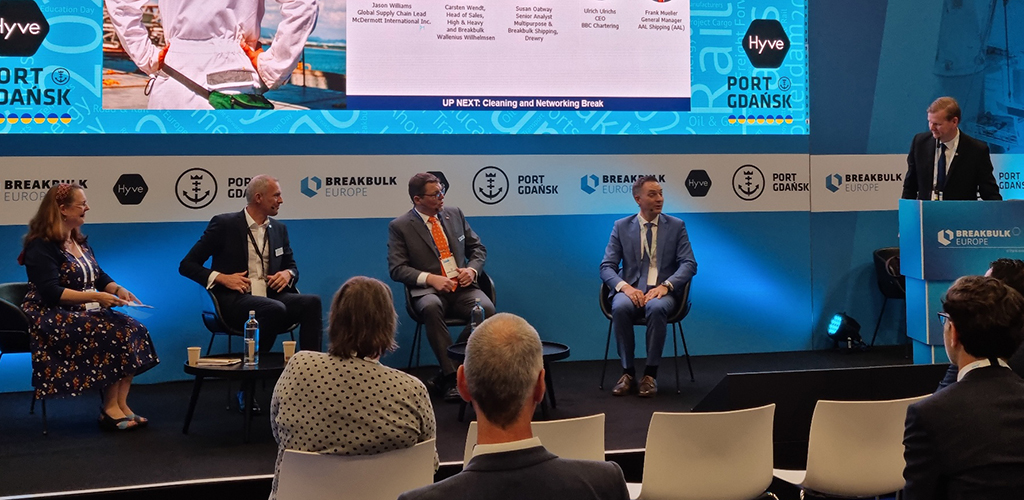May 18 | 2022
MPV Capacity Crunch as Congestion and Regulations Collide

By Carly Fields
SAME-DAY BREAKBULK AMERICAS COVERAGE: Ship congestion caused by China’s zero Covid policy coupled with incoming environmental regulations are playing havoc with multipurpose ship supply, according to a panel at Breakbulk Europe.
Speaking as part of the Managing Rates and Capacity: What is ‘Normal’? session, Carsten Wendt, head of sales, high & heavy and breakbulk at Wallenius Willhelmsen, described the current ‘normal’ as “absolutely chaotic” and “a nightmare”. He told the audience that the carrier Is facing heavy delays all over the world because of Covid. “This is not going away. The biggest concern is not so much rates, it is how to deliver what you promised and not have vessels waiting in ports.”
He added that it is very difficult to perform and maintain schedule certainty, with costs piling up for delivering and picking up from ports. “This is creating friction and concerns.”
Wendt warned that the effects of the regional lockdowns in China will be felt throughout 2022 and probably into 2023. “If you think about the six-day Suez blockage from 2021, that took two to three months to sort. Just imagine what a six-week lockdown in Shanghai will mean.”
The Covid shutdowns have collided with the arrival of international environmental regulations addressing emissions from shipping. While the Ballast Water Management Convention is already in force, more regulations will come into force in 2023 and these will impact MPV fleet availability even further. The regulations will require ships to be taken out of service for two to three weeks for retrofitting. Added to which, regulations entering into force in 2023 will require MPVs to slow down to meet emissions key performance indicators which will further impact capacity. Speaking on the panel, Ulrich Ulrichs, CEO of BBC Chartering, said: “You have to meet these regulations so either you go slower, or scrap the vessel.”
He added that BBC had “a lot of” ships that needed to be docked for retrofitting to meet environmental regulations. “As far as we are concerned China is out for drydocking, so the ships all have to come to Europe,” he said. “That means we have a cluster of ships in Europe and we can’t spread around docking schedules.”
Ulrichs warned the audience to also keep an eye on brewing union-related labor issues on the U.S. West Coast as well. While they primarily affect containers, they will have an impact on other sectors, he said. “This could be a massive disaster for all trades.”
He stressed that this is not a ship supply issue, it is a capacity issue with the MPV fleet stuck in ports waiting out lockdowns.
“In the past, the risk of delays was always manageable,” Wendt concluded. “Now it is so volatile and it is not just one port, it is many, all over the world. It is uncontrollable.”
Watch our post-session interviews with speakers:


